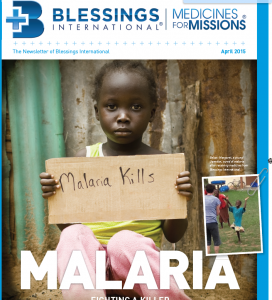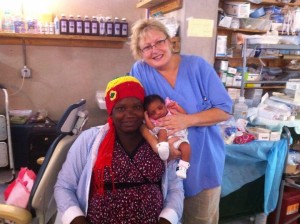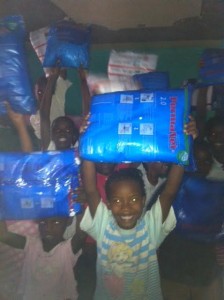Haiti (MNN) — Malaria is a major public health problem in Haiti. Blessings International’s Haiti Challenge aims to overcome it on World Malaria Day.
 (Photo courtesy Blessings International)
(Photo courtesy Blessings International)
As the poorest country in the Western Hemisphere, Haiti is also plagued by economic, development and public health challenges. These issues mean Haiti, along with neighboring Dominican Republic, remains one of the few places left in the Caribbean where malaria runs rampant.
Debbie Lammert, is an RN and director of Blessings International’s Mobile Medical Clinic for orphans in Haiti. She explains, “There are not public health situations [or] control measures in place, so many people come down with malaria every year.”
What’s more, since malaria is easily treated, it gets less press. Then, add in a different viral threat, and monies earmarked for malaria campaigns get diverted. “The international media coverage of Zika has sort of overwhelmed things and so people aren’t talking as much about malaria, although it is still here and hasn’t gone away.” The thing is, notes Lammert, while “Zika is an important virus and it needs to be addressed…Zika generally doesn’t kill and malaria does kill.”
Why is malaria such a problem?
Haiti’s 2010 earthquake created great places for mosquitoes to breed and spread the disease. When coupled with a weakened infrastructure, there were few tools available to resist either malaria or cholera. Yet, Haiti wants to eliminate malaria, one of the top five killers in the country, by the year 2020.
With a regular rainy season, prime breeding grounds, and few resources to combat the pests, what you get is a cyclical disaster. “We’re just now, the past couple of weeks, starting up for rainy season again. So, once again we’re starting to see many more mosquitoes, just within the past two weeks that I’ve been here. Of course, with that, more malaria–more of every kind of mosquito-borne illness.”
 (Photo courtesy Blessings International)
(Photo courtesy Blessings International)
Now, take the quake, the loss of life, the loss of jobs, and consider that hundreds of thousands of orphans were created by the disaster, according to UNICEF. Lammert says the government was hard-pressed to find places for all the children. ”Many of these orphanages, they don’t have the money to be in a nice place, so they’ve got a thrown-together building…They’re generally in areas that are less-desirable areas, and those are the areas that are going to collect standing water and have a higher mosquito population.”
Lammert observes that children’s homes, orphanages, or any other areas where there’s a crowded living situation, seem to give rise to more malaria cases. ”The malaria itself is carried by the mosquitoes, and often, it’s a mosquito that’s bitten someone else that carries the malaria to you. So, by the very fact of living in situations that are group situations, the risk of transmitting malaria is quite a bit higher.”
Into this context comes Blessings’ Haiti Challenge, and your chance to make a difference.
The Haiti Challenge
 (Photo courtesy Blessings International)
(Photo courtesy Blessings International)
Today, in recognition of World Malaria Day, Blessings International is partnering with Kairos 10 to give away anti-malaria medicine to any team ordering it during the months of April or May.
To find out details on this offer, click here.
Blessings also encourages you to consider ordering jewelry from Kairos 10. As part of this offer, anyone who orders a jewelry with Kairos 10 will not only be providing a treated anti-mosquito bed net to someone who needs it, but also a full course of anti-malarial medicine. The bed nets are in short supply, adds Lammert. “Currently, I’m in need of about 300, but soon we’re going to need a thousand.
“The orphan medical clinic project is a new program and it’s one that is growing. As we see more kids and more orphanages, of course, that’s going to be a big need for us, as well.”
She goes on to explain that her team looks for small Haitian orphanages to partner with, because they want to make sure that their kids don’t fall through the cracks. “These are often the ‘grassroots’ kind of Haitian people. Often, they’re pastors, and the vast majority of them are motivated to take in the orphans because of their love for Christ.” It’s a long-term commitment that they don’t take lightly, adds Lammert.
“We come, not just as someone who is going to hand things out to them, but as someone that is going to partner with them to further the body of Christ by raising these kids to know Christ.”